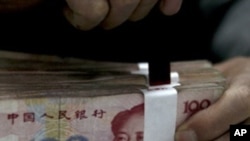Obama administration officials said Thursday the U.S. side will press currency reforms and human rights, including specific cases, at the U.S.-China Strategic and Economic Dialogue being held in Washington next week. The talks led by Secretary of State Hillary Clinton and Chinese State Councilor Dai Bingguo will include an array of cabinet-level officials from both sides.
It will be the third in a series of dialogues founded by President Barack Obama and Chinese President Hu Jintao in 2009.
Although major economic and political issues still divide the two powers, U.S. officials say the candid give-and-take among senior leaders has narrowed differences and broadened contacts across both governments.
At a news briefing, the U.S. Treasury Department coordinator for the China dialogue, David Loevinger, said the United States has seen "promising shifts" in Chinese economic policy since the initial meeting, including a five per cent increase in the value of China’s currency, the remimbi.
U.S. officials have long pushed for an end to Chinese policies that they say have artificially suppressed the remimbi’s value and added to chronic trade surpluses with the United States, and Loevinger said further currency shifts are among U.S. priorities at next week’s talks.
"We are going to press China let its exchange rate adjust at a faster pace, to correct its still-substantial under-valuation," said Loevinger. "We’re going to press China on protecting intellectual property rights in China. We’re going to encourage China to move more quickly in lifting the ceiling on interest rates on bank deposits in order to put more money into Chinese consumers’ pockets."
Treasury Secretary Timothy Geithner will lead the U.S. side in economic talks joined by other senior figures including Federal Reserve Board Chairman Ben Bernanke, while Secretary Clinton will chair the political discussions.
Assistant Secretary of State for East Asian and Pacific Affairs Kurt Campbell said that dialogue will cover among other things North Korea, Sudan and political upheaval in the Middle East.
He said the United States, as in all senior contacts with Beijing, will raise human rights issues including cases of specific individuals.
"We want to approach this critical matter from a principled and consistent approach," said Campbell. "You will see that in the President’s meetings, in the Secretary of State’s statements and all her meetings, we raise human rights issues, not just generally but specifically, specific cases. We ask our Chinese interlocutors for explanations about disappearances, about arrests, and legal procedures which we feel are either lacking or inappropriate."
Campbell said the sides will discuss counter-terrorism strategy in the wake of the killing by U.S. forces of al-Qaida leader Osama bin Laden, and said the United States "very much appreciates" Chinese statements supporting U.S. actions againts bin Laden's compound in Pakistan.
He said the dialogue, spanning Monday and Tuesday, will for the first time include a range of military officials from both sides with the aim of avoiding "misunderstandings and miscalculations" in interaction by the two powers’ armed forces.
Related video report by William Ide:













